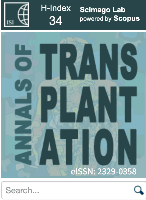
Annals of Transplantation
Scope & Guideline
Exploring New Horizons in Organ Transplantation
Introduction
Aims and Scopes
- Clinical Outcomes and Patient Management:
The journal focuses on the clinical outcomes of transplant procedures, emphasizing patient management strategies, post-operative care, and long-term survival metrics. - Transplant Immunology and Rejection Mechanisms:
Research on the immunological aspects of transplantation, including graft rejection mechanisms, donor-recipient compatibility, and immunosuppressive therapies, is a core focus. - Innovative Surgical Techniques and Technologies:
The journal highlights advancements in surgical techniques and technologies that improve transplantation outcomes, such as minimally invasive procedures and organ preservation methods. - Organ Donation and Ethical Considerations:
Exploration of organ donation practices, ethical considerations in transplantation, and the impact of socio-economic factors on donor availability and recipient outcomes. - Biomarkers and Predictive Models:
Studies on biomarkers for predicting post-transplant complications and the development of models to assess graft survival and patient risk factors are key areas of interest.
Trending and Emerging
- Impact of COVID-19 on Transplantation:
Research focusing on the implications of the COVID-19 pandemic on transplant practices, patient outcomes, and healthcare delivery has surged, reflecting the need for adaptive strategies in crisis situations. - Personalized Medicine in Transplantation:
There is a growing emphasis on personalized medicine approaches, including genetic profiling and tailored immunosuppressive regimens, to improve transplant outcomes and minimize complications. - Biomarkers for Early Detection of Complications:
An increasing number of studies are exploring the use of biomarkers for the early detection of complications post-transplant, aiming to enhance patient monitoring and intervention strategies. - Quality of Life and Patient-Centered Research:
There is a burgeoning interest in research focusing on quality of life and patient-centered outcomes in transplant recipients, emphasizing the holistic management of patients beyond surgical success. - Technological Innovations in Organ Preservation:
Emerging research on technological advancements in organ preservation, such as normothermic machine perfusion, is gaining traction, with implications for improving graft viability and outcomes.
Declining or Waning
- Traditional Immunosuppressive Protocols:
There is a diminishing focus on conventional immunosuppressive protocols as newer therapies and personalized medicine approaches gain traction in the literature. - Pediatric Transplantation Challenges:
Research specifically addressing challenges unique to pediatric transplantation has seen a decline, possibly overshadowed by broader adult-focused studies and innovations. - Historical Reviews and Case Reports:
The prevalence of historical reviews and case reports has decreased, as the journal increasingly prioritizes original research and clinical trials that contribute new knowledge. - Longitudinal Studies on Established Techniques:
Longitudinal studies examining well-established transplantation techniques are becoming less frequent, as the field shifts towards exploring novel approaches and outcomes.
Similar Journals
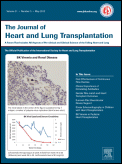
JOURNAL OF HEART AND LUNG TRANSPLANTATION
Exploring Breakthroughs in Heart and Lung TransplantationJOURNAL OF HEART AND LUNG TRANSPLANTATION, published by Elsevier Science Inc., serves as a premier platform for researchers and clinicians in the fields of Cardiology, Cardiovascular Medicine, Pulmonary and Respiratory Medicine, Surgery, and Transplantation. Since its inception in 1991, this esteemed journal has maintained a robust impact within the scientific community, currently holding a remarkable Q1 ranking in multiple categories as of 2023, indicative of its influential contributions to the field. With Scopus rankings placing it among the top ten in Surgery and fourth in Transplantation, it is essential reading for those looking to stay at the forefront of innovative transplantation techniques and cardiovascular research. Although not an open access journal, its rich content is crucial for advancing knowledge and promoting best practices, making it indispensable for professionals, students, and researchers dedicated to the life-saving field of heart and lung transplantation. The journal continues to foster academic excellence and facilitate impactful research, addressing contemporary challenges and innovations within these critical areas.
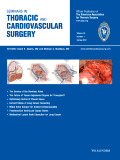
Seminars in Thoracic and Cardiovascular Surgery
Transforming Insights into Surgical InnovationsSeminars in Thoracic and Cardiovascular Surgery, published by Elsevier Inc, is a prestigious journal that focuses on advancing the fields of thoracic and cardiovascular surgery, cardiology, and pulmonary medicine. With a strong impact factor and an impressive reputation indicated by its 2023 rankings as Q2 in Cardiology and Cardiovascular Medicine, and Q1 in both Medicine (miscellaneous) and Surgery, the journal occupies a critical space in the academic landscape. Established in 1989, it has become a vital resource for researchers, clinicians, and students alike, fostering innovation through comprehensive reviews and cutting-edge studies. Although it does not offer open access, its robust editorial standards ensure that published articles contribute significantly to the ongoing discourse in surgical techniques and procedural advancements. Researchers and practitioners are encouraged to explore its rich compendium of peer-reviewed content that informs clinical practices and guides future investigations in the dynamic and evolving realm of thoracic and cardiovascular health.
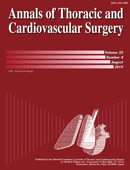
Annals of Thoracic and Cardiovascular Surgery
Shaping the future of surgery with cutting-edge research.Annals of Thoracic and Cardiovascular Surgery is a distinguished open-access journal dedicated to the advancing field of thoracic and cardiovascular surgery. Published by Int Acad Publishing Co Ltd since 2011, this journal has established itself as a vital resource for researchers, healthcare professionals, and students in the fields of cardiology, surgery, gastroenterology, and pulmonary medicine. With an ISSN of 1341-1098 and E-ISSN of 2186-1005, it offers an extensive collection of peer-reviewed research and innovative surgical techniques. The journal is headquartered in Japan and remarkably spans a history of convergence from 1998 to 2024, reflecting its ongoing commitment to publish cutting-edge studies that shape modern surgical practices. Ranking in the Q2 and Q3 quartiles across multiple categories, including surgery and cardiology, the journal's Scopus ranks—#210 in Surgery and #211 in Cardiology—underscore its influence and relevance in the academic landscape. Our aim is to foster a deeper understanding of surgical methodologies, critical care, and clinical advancements, thereby serving as an indispensable resource for the global surgical community.
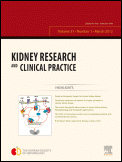
Kidney Research and Clinical Practice
Empowering professionals with vital research and reviews.Kidney Research and Clinical Practice is a premier open-access journal dedicated to advancing the field of nephrology and urology, published by the Korean Society of Nephrology. Established in 1982, this journal serves as a vital platform for researchers, clinicians, and students by disseminating pioneering research, reviews, and case studies that address significant challenges in kidney health and disease management. With a commendable Q1 ranking in both nephrology and urology categories in 2023, and an impressive standing in Scopus rankings (Rank #30/120 in Urology and #26/81 in Nephrology), the journal plays a critical role in shaping contemporary discussions and innovations in these fields. As an open-access publication, Kidney Research and Clinical Practice ensures wide-reaching visibility and accessibility, fostering collaboration and knowledge-sharing within the global medical community. For those looking to deepen their understanding of renal science and improve clinical practices, this journal is an invaluable resource.
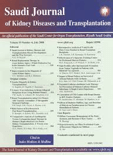
Saudi Journal of Kidney Diseases and Transplantation
Catalyzing knowledge exchange in renal science.Saudi Journal of Kidney Diseases and Transplantation, published by Wolters Kluwer Medknow Publications, serves as a vital resource in the fields of nephrology and transplantation, dedicated to advancing the understanding and treatment of kidney diseases. With an ISSN of 1319-2442 and E-ISSN 2320-3838, this esteemed peer-reviewed journal aims to facilitate scholarly exchange and promote innovative research since its inception in 2006. Recognized for its Open Access model since 2007, it enables widespread dissemination of critical findings, thereby enhancing the global impact of kidney-related research. With a solid reputation reflected in its current Q3 categorization in both Nephrology and Transplantation for 2023, the journal continues to contribute meaningfully to these essential medical fields. Researchers, clinical professionals, and students can access its wealth of information to further their knowledge and practice in kidney health and organ transplantation, vital components in the landscape of modern medicine.
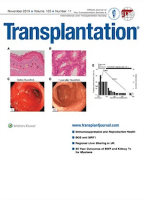
TRANSPLANTATION
Empowering Professionals with Cutting-edge Transplant Research.TRANSPLANTATION is a premier journal in the field of organ transplantation, published by Lippincott Williams & Wilkins, that has been a cornerstone of transplantation research since its inception in 1963. With an impressive impact factor cementing its status, this journal is categorized in the top quartile (Q1) of its field, currently ranking 6th out of 54 in the Scopus Medicine Transplantation category, placing it in the 89th percentile. The journal publishes original research, clinical studies, and reviews that significantly advance our understanding of transplantation science, ensuring that professionals, researchers, and students remain informed of the latest developments. Although it is not an open-access journal, it offers valuable insights that contribute to enhancing practice and improving outcomes in transplantation medicine, making it an essential resource for anyone involved in this dynamic and impactful discipline.
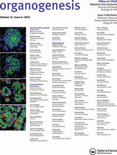
Organogenesis
Connecting Science and Medicine through Developmental Insights.Organogenesis is a leading journal published by Taylor & Francis Inc, dedicated to advancing the field of developmental biology and regenerative medicine. With an ISSN of 1547-6278 and E-ISSN 1555-8592, this journal spans an extensive research scope that includes embryology, transplantation, and biomedical engineering, distinguishing itself as a crucial platform for researchers and practitioners alike. Its impact is reflected in its performance across various categories in 2023, earning Q3 rankings in Biomedical Engineering and Embryology, Q4 in Developmental Biology, and Q2 in Transplantation, showcasing its reputable standing among peer journals. Moreover, with Scopus rankings indicating strong positioning in the fields of medicine and biochemistry, Organogenesis is essential for those looking to publish or stay updated on pioneering research. The journal facilitates rigorous peer-review and offers a forum for disseminating innovative findings, making it an invaluable resource for academics, professionals, and students committed to understanding the complexities of organism development.
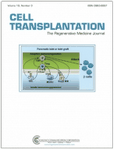
CELL TRANSPLANTATION
Elevating knowledge exchange in regenerative health.CELL TRANSPLANTATION is a premier multidisciplinary journal dedicated to advancing the field of regenerative medicine and transplantation, published by SAGE PUBLICATIONS INC. Since its initiation in 1992 and embracing an open-access model since 2017, the journal aims to disseminate high-quality research that covers both clinical and experimental studies on cell and tissue transplantation. With a notable impact reflected in its 2023 Q2 ranking in Biomedical Engineering and significant standings in Cell Biology and Transplantation, CELL TRANSPLANTATION serves as a vital resource for researchers, practitioners, and students alike. The journal's commitment to fostering innovation is evident in its diverse contributions that address the complexities of tissue engineering, immunology, and regenerative therapies, inviting readers to engage with cutting-edge science that is poised to transform medical practices and improve patient outcomes. The journal's insightful articles and research findings make it a crucial platform for knowledge exchange within the vibrant scientific community.

Revista de Nefrologia Dialisis y Trasplante
Connecting professionals to enhance kidney care.Revista de Nefrologia Dialisis y Trasplante (ISSN: 0326-3428; E-ISSN: 2346-8548) is a prominent open-access journal published by the ASOC REGIONAL DIALISIS TRASPLANTES RENALES since 2013, located in Buenos Aires, Argentina. This journal serves as a vital platform for the dissemination of pivotal research findings in the fields of nephrology and transplantation, covering a wide range of topics including clinical practices, patient outcomes, and innovative therapies. Although currently ranked in the Q4 category in both Nephrology and Transplantation by Scopus, the journal aims to elevate the discourse within these scientific communities by providing accessible and high-quality research to professionals and researchers alike. With its commitment to advancing knowledge and fostering collaboration among scientists, practitioners, and students, the Revista de Nefrologia Dialisis y Trasplante plays an essential role in addressing the critical challenges and developments in kidney health and organ transplantation.

Progress in Transplantation
Connecting Researchers and Clinicians for ProgressProgress in Transplantation is a leading journal published by SAGE Publications Inc, focusing on the dynamic field of transplantation medicine. With an ISSN of 1526-9248 and E-ISSN 2164-6708, this journal serves as a crucial platform for researchers and clinicians aiming to share cutting-edge findings and advancements in organ transplantation. Despite not being an Open Access journal, it provides a significant contribution to the academic community, evidenced by its placement in the Q3 category of Transplantation for 2023 and its ranking of #33 out of 54 in Scopus, showcasing a percentile standing of 39th. Progress in Transplantation has been dedicated to publishing high-quality research since its inception in 2000, and it continues to be a vital resource for those seeking to enrich their knowledge and foster innovation within the field of transplantation, fostering collaboration among practitioners, researchers, and students alike.